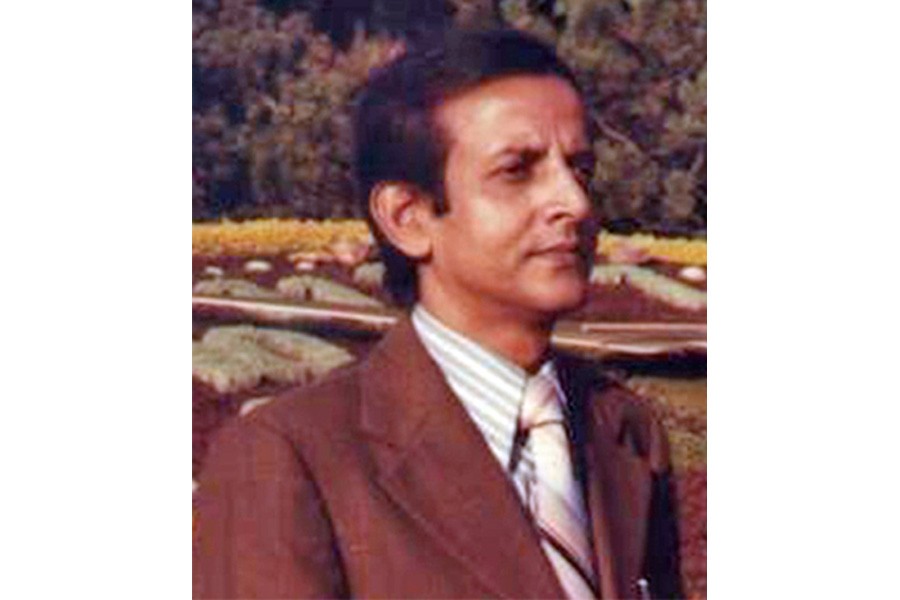
Published :
Updated :

Not everyone becomes a celebrity. There are great people who don't educe envy in people's mind by their greatness. They have a lot of knowledge, they work day and night. But they like to remain silent and hate to boast about their abilities. When they succeed, their success could easily make a big noise. But they silence the voice of their successes. Achievement, to their opinion, should not be loud and noisy. They may not be celebrities, but they have a great story which they don't like to read out aloud. These people are successful and they have two things on their lips: one is silence and the other is smile.
Justice M. A. Karim was one of those silent types who passed away on Friday, August 25, 2017 at Combined Military Hospital, Dhaka. He was 84. He was later buried at his family graveyard at village Dhanpur, near Comilla town. His first Namaz-e-Janaza was held at Dhanmondi, Dhaka and the second Namaz-e-Janaza at his village home. A widower for about 15 years, Justice Karim has left behind his two daughters, one son, two sons-in-law, his brother, and many of his relations and friends to mourn his death.
Justice Karim during his lifetime was an epitome of excellence in all standards of human adjudication. He simulated this excellence since the very day he started his career as a Munsiff (junior judge) back in the early 1960s. He went on to hold other important and dignifying positions in the judiciary including being District Judge of Kushtia, Mymenshing, and Jessore districts. He was Judge of Administrative Tribunal, Judge of Labour Appellate Court, and held many other vital positions during his long career for more than 40 years. He was Secretary of the Ministry of Law in 1990, eventually became Justice of Bangladesh Supreme Court in 1991 and retired from judgeship in 1999.
As a judicial officer, he championed the cause of justice with all honesty, integrity and vigour. He also made significant contributions in framing Maritime Law of Bangladesh during his tenure as Director, Maritime Wing, Ministry of Foreign Affairs. He, along with the then Chief of Bangladesh Navy, attended several international conferences, including sessions in the United Nations, to safeguard Bangladesh's maritime interests. He had a two-year course on Town Planning from Sheffield University in the United Kingdom where he had learned how to frame law that facilitates long-term town planning. Securing the highest marks in the then EPCS (Judicial) examination he was on top of the list of his batch-mates.
I am fortunate to learn many known things and unknown facts about law and jurisprudence from Justice Karim as he was my eldest brother-in-law. Among my close relations on both paternal and maternal sides he was the first person to hold the highest positions in government service as a Secretary and a Judge in the Supreme Court.
A judge, as we all know, must be independent, impartial, and must display integrity and propriety in all matters of conduct, both in and out of court. But, my brother-in-law, as I assumed (maybe wrongly), was a bit obsessed with following those conducts extremely religiously. Watching his hermit-like conducts and behaviour I developed an impression that judges were probably trained to be remote, out of touch and divorced from society and they perhaps enjoyed living a kind of 'monastic' life. I would imagine judges were debarred from mixing with people, even with their distant friends and relations. Judges, by and large, are basically taciturn; they are courteous but their job demands them to be faintly aloof.
Justice Karim was proud of his judiciary job. He would feel uncomfortable when he found a sitting judge or a judge appointed in any constitutional position talking unnecessarily to media people. To his opinion, it was unfitting for a judge, even if he is retired or out of the court, to defend or talk about his opinion or judgment publicly or to the Press; judges must be immune from the effects of media gossips and must conduct themselves in a manner that maintains the standing and dignity of the judiciary.
Justice Karim wouldn't even read newspapers or view television news or talk shows if any litigation issue in his court appeared in any news forums, lest he gets biased by the gossips or speculation in the media. Media gossips, he would say, must not enter a judge's mind during a trial. Forget about going to a club or merrymaking with lawyers, during his long career, he avoided attending public or family functions, even a marriage ceremony, if the invitation was not from a very close relation. He would reject any extraneous attempt, direct or indirect, to influence him, by any means. Even his wife (my eldest sister) could not dream of approaching his husband to curry any judicial favour for any of her friends or relations.
Justice Karim was a symbol of everything good, chaste, and courageous. His colleagues fondly remember how he lived his life and let that impact their lives. It was with a heart full of deep sentiments that his colleagues, friends, and relations got the sad news about the departure of his life from this terrestrial domicile. To lose such a graceful man, a dedicated judge, a gentle soul, a loving husband, a caring father, and a truly affable personality to the cold hand of death was indeed disheartening. God has taken him away from us, but he lives in us, in the various things he did. His memory will remain evergreen.
maswood@hotmail.com


 For all latest news, follow The Financial Express Google News channel.
For all latest news, follow The Financial Express Google News channel.